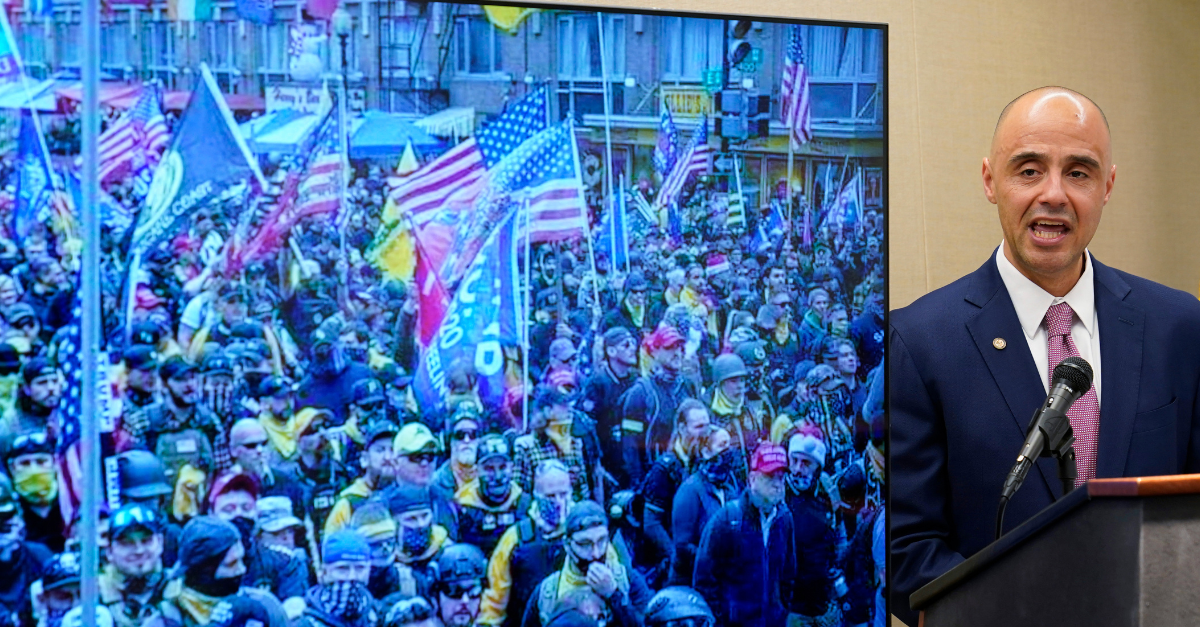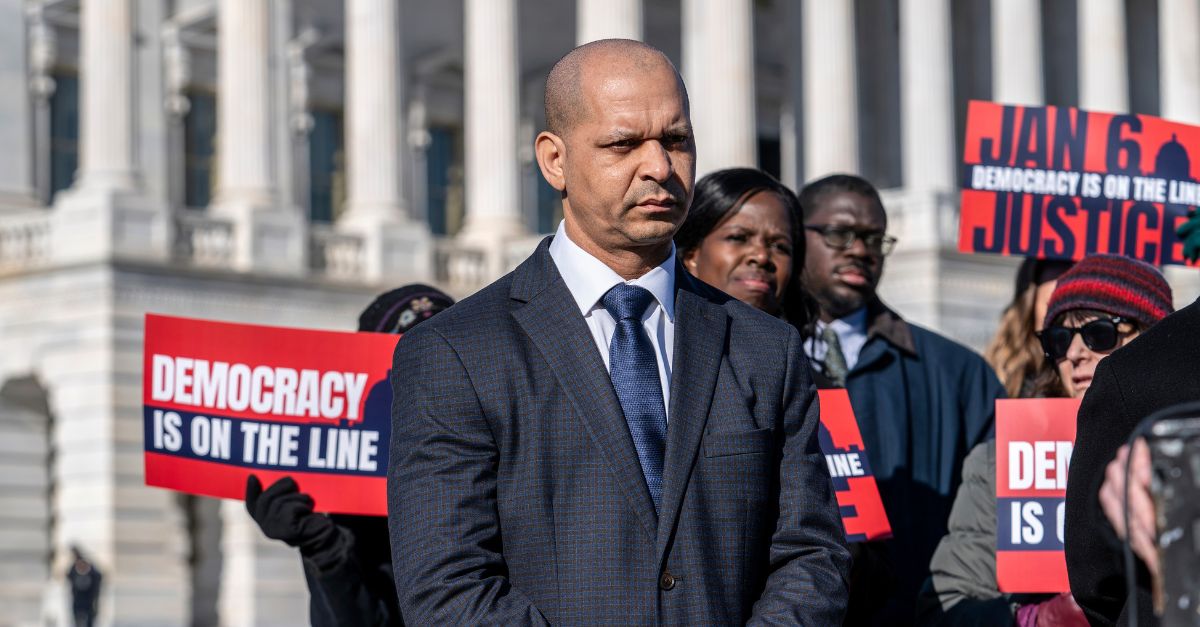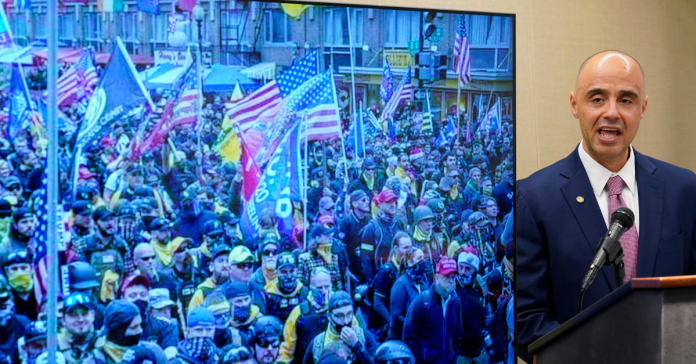
U.S. Attorney for the District of Colombia Matthew Graves speaks about the unfolding of the Jan. 6 attack on the Capitol during a presentation ahead of this year’s third anniversary in Washington, Thursday, Jan. 4, 2024. (AP Photo/Susan Walsh)
When U.S. Attorney Michael Graves took the podium at the Justice Department this week to reflect on the impending third anniversary of the attack on the U.S. Capitol on Jan. 6, 2021, there was a screen behind him prepped to project photos from that day and in the bottom left corner, in simple unassuming font, the slideshow appeared titled with four words: As Proven In Court.
Three years have passed since a mob attacked the U.S. Capitol, many of its adherents armed with real and makeshift weapons. Some were violent, brutally so. Some were not but were obstructive to the certification of the 2020 election or the officers tasked to protect Congress. Some were seditious — as proven in court — and some were acquitted of that rare and most traitorous charge when a jury of their peers carefully considered the evidence over a series of trials that spanned months.
In this time, the U.S. federal government — its judges, prosecutors and politicians, as well as the American people alike — have wrestled fiercely over the details of Jan. 6, debating everything from its legality to its historic import, its successes and failures, the accountability required to reckon with it, and even, the very definition of words used to describe it: What does it mean to obstruct something “corruptly?” Was Jan. 6 an insurrection or not?
Only until the tail end of 2023 did a court in the U.S. find that the man at the very center of Jan. 6 — former President Donald Trump — did “engage” in insurrection and disqualify him from the ballot.
And that controversial opinion itself only came but a few scant months after Trump was finally indicted in Washington, D.C., for what some might call, euphemistically, the whole enchilada: criminally conspiring to overturn the election. Now that case is barreling ahead and fraught with questions that demand answers about power and the separations of it in the U.S.
The ramification of Jan. 6’s chaos, has by and large, been order. The very system that dozens of individuals sought to subvert or to overcome by force or bend to their will using means beyond the peaceable bounds of their First Amendment protections, has, steadily and so far, won the day. The rulings may not be liked by all, least of whom the defendants, but there still exists process, order, and the right to appeal.
Whether a defendant conspired to violently stop the transfer of power, assault police or were charged with a simple misdemeanor, all who have returned to the nation’s capital to meet their fate in the aftermath of Jan. 6 walk into a courthouse that upholds the rule of law, not the rule of mob or the rule of one man.
Jan. 6 Capitol riot: By the numbers
1,265 defendants charged in all 50 states, including the nation’s capital.
452 have been charged with assaulting, resisting, or impeding officers and 123 have been charged with using a deadly weapon or causing injury to an officer.
1,186 defendants have been charged with entering or remaining in a restricted area and of them, 116 carried a deadly or dangerous weapon.
71 defendants were charged with destruction of property; 56 with theft.
Over 300 defendants were charged with corruptly obstructing, influencing, or impeding an official proceeding or attempting to do so
57 have been charged with conspiracy, whether it was conspiracy to obstruct Congress, law enforcement, or some combination of it. The “corrupt” aspect is now being debated in the courts and could find its way before the U.S. Supreme Court this year.
139 contested trials where defendants were found guilty.
718 people who pleaded guilty and at least 213 of whom pleaded guilty to felony charges while 505 pleaded guilty to misdemeanors
749 people have been sentenced for their actions on Jan. 6
467 have been sent to jail including the founders of some of the nation’s most politically extreme groups like the Proud Boys and Oath Keepers.
Though only 140 officers were reported as injured by the Justice Department, that data point speaks nothing of those left with trauma that wasn’t just physical.
When Graves spoke to reporters last week, he remarked that the “siege of the Capitol is likely the largest single-day mass assault of law enforcement in our nation’s history.”
It was certainly the worst assault retired U.S. Capitol Police Sergeant Aquilino Gonell ever experienced, he told Law&Crime in a telephone interview Friday. He has been sharply outspoken about Jan. 6. and has testified in court to provide statements at sentencing hearings meant to help judges render a sentence.
“I was assaulted by more than 40 people,” Gonell told Law&Crime.

WASHINGTON — JANUARY 5: Former U.S. Capitol Police Sgt. Aquilino Gonell listens during Rep. Jamie Raskin’s event outside the U.S. Capitol on Friday, Jan. 5, 2024, about threats to democracy three years after the Jan. 6 attack on the Capitol. (Bill Clark/CQ Roll Call via AP Images)
The mob on Jan. 6 forced him into an early retirement from a job he loved and had settled into after serving in the U.S. military. An immigrant who has served his country for two decades, Gonell required two surgeries as a result of the beatings he sustained on Jan. 6 when he was profoundly overwhelmed by the mob. One surgery was for his foot, another for his left shoulder. On Friday, he recalled how both of his hands were bleeding profusely that day. There are scars now.
They are physical but there are also mental and moral scars, he said.
In the immediate aftermath of the attack on the Capitol, Gonell said he was frustrated with the rule of law’s response to Jan. 6. Accountability was not happening fast enough nor did he believe “people were going out taking things as seriously as they should be,” he explained.
“I began to realize the justice system is a little slower to catch up with this huge investigation,” he said while recalling how some of the initial convictions and charges seemed to be so small for what he had just seen and experienced.
“Initially, I was disappointed and upset that some of these people who were inside the capital complex … I knew there were clearly signs of ‘area closed,’ there were fences, barriers, police officers, doors, windows — in order for them to get into the building, they had to go right through all of that. When the justice system began its work, I kept getting upset because some of these people were getting [sentences like] house arrest and it bothered me. I thought they weren’t taking things seriously,” he said.
But even beyond that, the factors of the day were enough, he said.
“[Some of these defendants] are claiming they were not assaulting anybody or impeding anybody or stopping me or my colleagues from doing our job. But let me ask you this: how can I get to the most violent people if the peaceful people in front of them are preventing me from getting to them? If there are three or four people ahead of that violent person, they are stopping me from doing my job.”
As time has passed and he has assisted prosecutors through victim impact statements or testimony, Gonell said his opinion of the justice system varies.
“If I know and identify people who assaulted me, I show up to court, I give my statement, I testify because I don’t want the judge to not know me, not see me, or know what they did to me because they did a lot of things to me. When they go in front of the judge and ask for leniency and say, ‘Well I have a family, I have a kid, I have a granddaughter, I’m too old, I’m too frail, I’m too young, I was stupid, I was caught up in the moment, my health is not good, I’m a veteran, I have PTSD, here’s my letters from my friends, or family or doctors,’ well, I could do the same thing and get those letters. The only difference is, I’m going to be doing it because I did the right thing,” he said.
Recently, Speaker of the House Mike Johnson called the Republican Party the party of law and order. Johnson then said he would blur out the faces of “innocent people” filmed inside the Capitol and appearing in surveillance footage because he didn’t want the Justice Department identifying them for prosecution.
“These are the same people who breached the Capitol and entered the Capitol to hunt lawmakers like him and his colleagues down, room by room, seeking blood,” Gonell said.
Law and order, in his estimation, is not a priority among certain members of Congress.
If not for what he and his colleagues did on Jan. 6, he said Friday, “especially from the west front inside the tunnel,” Gonell said he doubts Johnson would be able to say anything of Jan. 6 at all today.
“They seem to have forgotten the fear and the danger they felt on that day to the point that they no longer respect the rule of law, don’t care who gets injured, whose career was ended, how many officers were injured, they only care to portray the events of Jan. 6 as a ‘fedsurrection” or “antifa” or “deep state” or anybody else but the person who was solely culpable,” he said.
U.S. Attorney Graves noted this week that in the years since Jan. 6, many people have left their positions at the Capitol because they couldn’t physically continue to serve. Others have chosen different pursuits to uphold law and order. Former U.S. Capitol Police Officer Harry Dunn, who testified to the House Select Committee Investigating the Jan. 6 Attack on the U.S. Capitol and also served as a witness in the Oath Keepers seditious conspiracy trial, announced his resignation from the police force this week. Dunn, who was abused by rioters and on the receiving end of racial slurs during the siege, formally announced Friday that he was running for a seat in the U.S. House as Maryland’s third district representative.
When President Joe Biden delivered a speech Friday reflecting on Jan. 6 and making his first big campaign speech aimed at his reelection in 2024, he remarked how Trump, who is leading the Republican nominee pool for the presidency, only seeks “revenge and retribution.”
“Democracy is on the ballot. Your freedom is on the ballot,” Biden said.
Whether Trump will even be eligible for that ballot is unclear. Aside from the criminal indictments he faces in four venues, Trump is also facing a battle launched by voters to disqualify him from the ballot under Section III of the Fourteenth Amendment, or the Constitution’s insurrection clause. It’s on track to be decided by the Supreme Court, where, for better or worse, disputes in a system shaped by law and order must be proven in court.
Have a tip we should know? [email protected]

